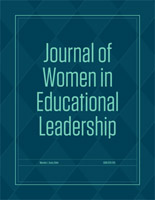Educational Administration, Department of

Journal of Women in Educational Leadership
Date of this Version
1-2008
Document Type
Article
Citation
Journal of Women in Educational Leadership, Vol. 6, No. 1-January 2008 ISSN: 1541-6224
Abstract
Women superintendents in one Midwestern state participated in this study of their personal demographics, professional qualifications and career paths, and demographics of districts and boards of education that hired them. Participants identified characteristics, skills, and barriers to women seeking superintendencies. Thirty-one of 36 women superintendents completed a survey, with six participating in follow-up interviews. Initial analysis supports existing research on women superintendents. A second analysis of interview data using Babcock and Laschever's (2003) research on women's negotiation skills and social networks as a theoretical framework suggests implications to train and support women aspiring to the superintendency. Historically underrepresented in school leadership, women have struggled to gain access to top administrative positions dominated by white males (Blount, 1998; Brunner & Grogan, 2007; Grogan & Brunner, 2005; Marshall, 2004; Shakeshaft, 1999; Tallerico & Blount, 2004). The superintendency is the most male-dominated executive position in any profession in the United States (Dobie & Hummel, 2001). Engrained cultural and social norms have perpetuated men's overrepresentation (Grady, 1992, 1995; Shakeshaft, 1989, 1999), yet, "firm explanations for the under representation [of women in superintendencies] continue to elude us" (Banks, 2001, p.77). This study describes women superintendents in one Midwestern state. Women superintendents described personal demographics and career paths, demographics of school districts and boards of education that hired them, and skills, characteristics, and barriers they thought were important in their selection. Thirty-five acting women superintendents were asked to complete a mail survey. Six women provided detailed insights about their experiences in follow-up interviews with the first author, the remaining woman superintendent in the state.


Comments
Copyright © 2008 Pro>Active Publications. Used by permission.